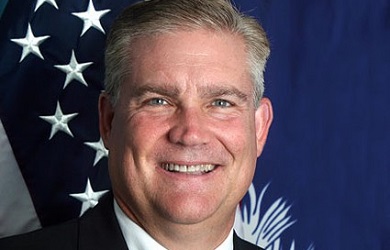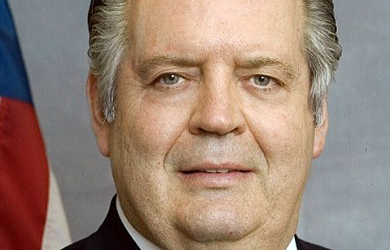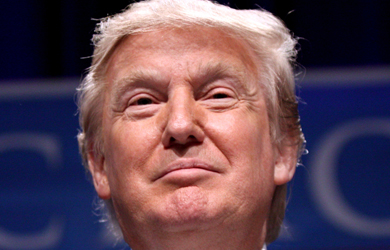Religious Right leaders believed this was their year. In Ted Cruz they had a candidate unquestionably committed to their agenda. Cruz was anointed the movement’s candidate at a secret endorsement meeting in Texas, followed by a wave of public endorsements by movement leaders. With only a couple of notable exceptions like Jerry Falwell Jr. and Phyllis Schlafly, Cruz had the overwhelming backing of the Religious Right’s institutional leaders.
But it wasn’t to be. David Gushee, a Christian ethicist and author who has ruffled a lot of feathers with his move to an LGBT-affirming stance, calls the Trump victory “a major defeat” for “the Christian Right agenda.” Indeed, many Religious Right leaders and activists are bitter that Republican primary voters, including many self-described evangelicals, chose Trump over Cruz, and some have declared that they have no intention of backing Trump now that he is the presumptive GOP nominee.
The Wilks brothers, leaders of a billionaire fracking family that poured millions into a pro-Cruz super PAC, are planning to sit out the presidential race, reported Bloomberg. A family spokesperson called Trump a liar whose “despicable statements and actions” are too numerous “to count in a reasonable amount of time.”
Anti-gay activist Matt Barber is in the same camp, tweeting with the hashtag #NeverTrumpOrHillary and asking, “But what about when neither of the two evils is lesser?” On Friday, Barber tweeted, “I don’t oppose #Trump because I’m Republican & he’s not. Nor because I’m conservative & he’s not. I oppose Trump because I follow #Christ.”
A contributor to Barber’s BarbWire website, history professor Alan Snyder, wrote in piece titled “The Republican Obituary” that he “cannot, in good conscience, support Donald Trump.” Snyder slammed Republican voters for choosing “a man who rejects nearly every line in past Republican platforms.”
In an angrily bitter diatribe against Trump supporters at Charisma, Bert Farias of Holy Fire Ministries wrote that Cruz’s defeat “exposes the corruption of the American soul.” Maybe, he says, exposing the “corruption of the American soul and lukewarm church” is what God raised up Cruz to do. “While many celebrate the apparent victory of their amoral candidate, the darkness grows and moves in yet closer.” Faris even recalled, “Benny Hinn prophesied on New Year’s Eve 1989 that a woman would one day be president of America and would destroy this nation.” Adds Faris, “It seemed like a far-fetched prophecy then, but not so much anymore.” Kevin Swanson, the anti-gay pastor who says the government should execute gays, suggested that God may be raising up Trump to be president as part of a divine plan to destroy America for its disobedience.
“Don’t blame us,” writes Napp Nazworth, an editor at Christian Post. “Evangelicals led the opposition to Trump.”
Trump has already been a disaster for the Republican Party, essentially dismantling the Reagan coalition and undermining its efforts to retain control of Congress. A Trump presidency would be a disaster for the entire nation, given that he is entirely unfit, in character and experience, to be president.
For those reasons, it’s important to set straight the historical record — evangelicals led the opposition to Trump.
Trump has won a lot of votes from people who call themselves evangelicals, but there’s evidence that the most frequent church-goers, probably the same people most likely to listen to Religious Right political leaders, have been much less likely to support Trump.
In February, the Christian Post editorialized against Trump, the first time ever it had taken a position on a political candidate:
“As the most popular evangelical news website in the United States and the world, we feel compelled by our moral responsibility to our readers to make clear that Donald Trump does not represent the interests of evangelicals and would be a dangerous leader for our country,” they wrote.
Republican voters have concluded that morality, integrity, the rule of law, and the Constitution must be discarded in their headlong dash into an angry reaction against all politicians, even someone like Ted Cruz who has fought the good fight for Biblical and constitutional principles all his life.
In doing so, they have brought this nation to the brink of near-total collapse. No matter who wins in the fall, Republican or Democrat, Christian values will be subjected to even greater governmental suppression. No matter how Trump fares in the general election, the very fact of his nomination is a dismal indication that whatever honor and principle remained in the Republican party is now in the past.
Some high profile right-wing pundits remain in the #NeverTrump camp, like Erick Erickson. Iowa talk radio host Steve Deace reacted to Cruz’s withdrawal by resigning from the Republican Party. Jerry Bader, conservative talk radio host in Wisconsin, is with him:
“I do not want to see Hillary Clinton as president; however, I do not see Donald Trump as a better choice. Important point: There is no lesser of two evils,” Mr. Bader said. “I have no reason to believe his Supreme Court nominees would be any more palatable than hers because I have nothing to go on but his word, and that don’t mean much to me.”
U.S. Sen. Ben Sasse of Nebraska is probably the highest-ranking Republican official who has made it clear that Trump will not get his support. He said recently that he is resisting calls from “party bosses and politicos” telling him he has to support Trump. Sasse is trying to generate support for a third-party or independent candidate to enter the race.
The Family Research Council’s Tony Perkins, a strong supporter of Cruz, is among those hedging their bets, saying evangelicals “won’t necessarily fall in line” with Trump as the nominee. While he has made his disappointment clear, he says he is “waiting to see the substance of a Trump administration and the vision he has for America.” Anti-gay activist Brian Brown of the National Organization for Marriage is also taking a wait-and-see approach. And Samuel Rodriguez of the National Hispanic Christian Leadership Conference has criticized Trump’s anti-immigrant rhetoric but says Hispanic evangelicals “are still up for grabs.” Religious Right activist Michael Farris of the Home School Legal Defense Association told The Hill that Cruz should “keep his powder dry and not do anything right now” while waiting to see how Trump behaves in the general election.
Of course, the most intense focus going forward will fall on Ted Cruz, the Religious Right’s anointed candidate. As runner-up and as a GOP senator, he would normally be expected to endorse the victor. But the ugly personal tone of Trump’s attacks, and the refusal of some Cruz backers to go along with the party’s ultimate choice, might make this year an exception.
Former presidential candidate Mike Huckabee is more enthusiastic than many of his fellow Religious Right activists: “Donald Trump broke the code, owned the media, and inspired the masses. I will be all in to help him defeat Hillary Clinton and I call upon all fellow Republicans to unite in defeating Hillary and abandoning and repudiating the hapless ‘Never Trump’ nonsense.”
The Washington Times reports that party officials are using the prospect of future Supreme Court nominations to cajole #NeverTrump people into getting on board the Trump train. As Miranda has reported, the Supreme Court is the main reason that anti-abortion activists are reluctantly lining up with Trump. Perkins said this week, “We can live with bad trade deals or high taxes, but we cannot live with bad judicial nominees.”
Indeed, Trump has already said that he will let the Heritage Foundation, the conservative group led by Religious Right icon Jim DeMint, draft a list of potential justices.
Right-wing activist Grover Norquist thinks Cruz should make a deal, reports The Hill. “Norquist said Cruz will stay aloof for a while but ultimately back Trump, perhaps in exchange for a promise to be appointed to the Supreme Court.”








